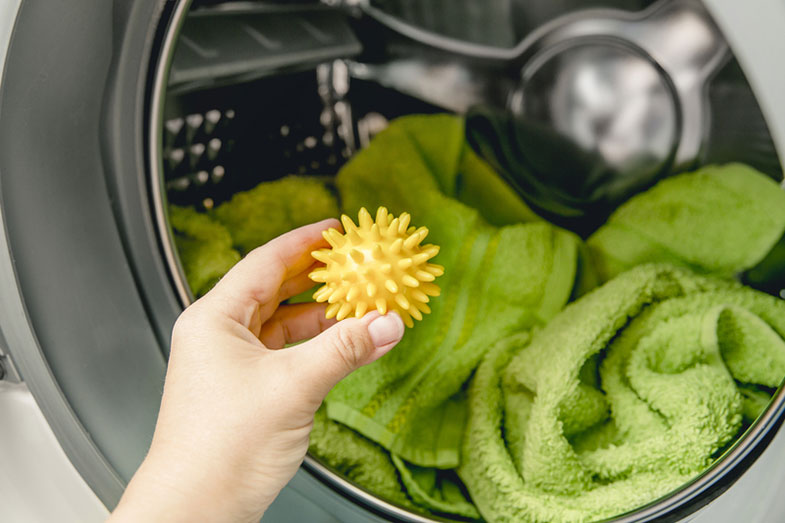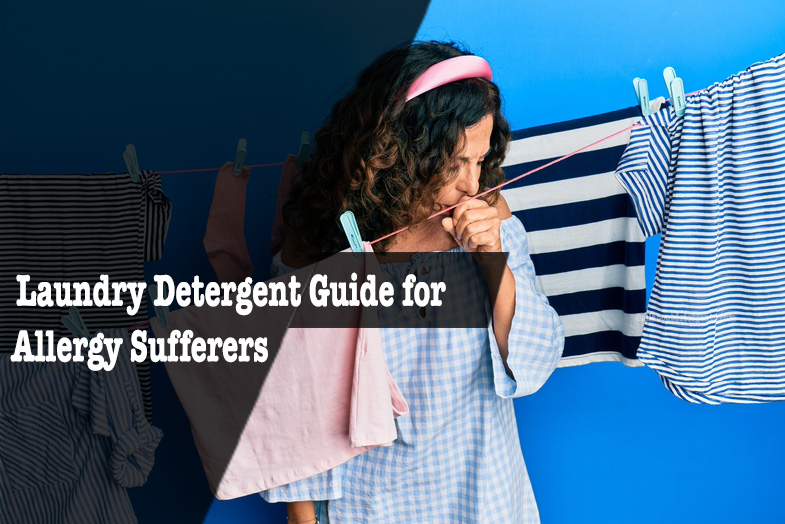The flowery-smelling laundry detergent in your house is made of many allergy-causing chemicals. These chemicals affect a large number of people all over the world. Besides affecting human health, these toxic chemicals have not spared our environment, especially aquatic life.
The main ingredients used in laundry detergent are the cause of allergy. These chemicals include dyes, fragrances, and other such elements. Conditions like contact dermatitis and rash are prevalent; the primary reason was laundry detergent.
Even if laundry detergent does not cause your allergy, it can worsen the situation. An allergic person should be more careful in this situation. Taking preventive measures and using hypoallergenic detergent can be quite helpful. If you are one of those allergy sufferers, you must stay to the end to find some fantastic tips to help reduce allergies.
Common Causes of Allergy
Laundry detergent combines various synthetic chemicals that give it cleaning properties and make the clothes smell fresh. Since almost all the ingredients in a detergent are artificial, they threaten our health. These chemicals are involved in health issues like skin and eye irritation, allergies, asthma, and other respiratory disorders.
Fragrances, dyes, and surfactants are significant issues of concern. They are the most common allergens. This is why allergy sufferers are recommended to eradicate these chemicals instead of fragrance and dye-free laundry detergents.
Other than these allergens, some enzymes, preservatives, colors, dyes, thickeners, bleach, and fabric softeners also cause allergies. When repeatedly exposed to such chemicals, allergy grows and ultimately inflames your skin. After that, a mild trigger is enough to produce a reaction.
Allergens in Laundry Detergent
Several synthetic chemicals are used in detergent to boost its performance. Along with cleaning the clothes, these chemicals affect us and our environment in many ways. Here is the list of those hazardous chemicals.
Fragrances
We all perceive that as long as our clothes smell good, they are clean. They must be dirty if they do not smell all flowery and fresh. Considering this, detergent brands have started adding synthetic fragrances to laundry detergent.
Initially, these fragrances were added to cover the surfactants’ unpleasant smell. Later on, these scents became part of the detergent composition.
Benzene is an aromatic chemical compound that is toxic. This chemical is commonly used as a fragrance in laundry detergent. It is associated with causing skin and eye irritation and triggers several types of allergies.
Other than that, many detergent brands add a lot of synthetic fragrances to cover up the weak cleaning power of their detergent. We perceive that good-smelling detergent cleans the clothes effectively, but the case is not always.
Surfactants
Surfactants are a group of chemicals that reduce the surface tension of water to allow the easy suspension of dust and other dirt particles in water. Once suspended, the dirt particles quickly getaway along with the water. For this reason, surfactants are used in several cleaning products like cleansers, detergents, and other skincare products.
A common type of anionic surfactant called Sodium Lauryl Sulfate (SLS) is used in laundry detergents. Besides being a suitable cleaning agent, it is also a skin irritant. Many surfactants are also carcinogenic, but SLS is not one of those.
An alternative to SLS called SLES (Sodium Laureth Sulfate) is used in most laundry detergents. Unlike SLS, it is not a skin irritant. If this chemical is present in a laundry detergent, know it is safe.
Besides their presence in laundry detergent, SLS and SLES are used in various cosmetic products. Be cautious of the ingredients in the items you apply to your skin.
Laundry Tips for Allergy Sufferers

You can follow these simple tips to get rid of skin allergies completely.
Wash in Hot water.
Washing clothes in hot water is always recommended, especially those with lots of dirt and stains. High water temperature kills bacteria, germs, and other allergens; thus, bring out fresh, clean clothes that will not interfere with your skin.
However, some clothes can never be washed at a high temperature as they risk being damaged. We do not have any other option for them. To be safer, try to use a special fragrance-free or similar allergen-free detergent for such clothes.
Purchase Fragrance-free Detergent
The strong scent and chemicals in the laundry detergent can trigger allergies. This is why using a detergent free of perfume and chemicals is necessary to avoid evoking a chemical reaction. The best detergent is the one that is free of fragrance and dye.
Remember to read the label every time you purchase laundry detergent. The detergent is free from all allergens like phosphate, fragrances, and dye; buy it.
Read More: 10 Laundry Detergent Types You Must Know
Rinse the Clothes At least Twice
Rinsing the clothes just once may not be enough since detergent could keep lingering on the clothes. Detergent contains all the allergens; if the detergent stays on the clothes, it will get in touch with your body, triggering the allergy.
Rinsing clothes more than once is a good idea. By rinsing twice, you are sure no more allergen or detergent residue is left on the clothes, and they are now entirely safe to wear. High-efficiency washing machines usually have this extra rinse option, which you can select to rinse the clothes more than once.
Wash New Clothes Before Wearing Them
Several chemicals and finishes are applied to make the clothes look more attractive. Besides, these clothes usually travel a long way in different trucks and compartments before reaching you. Thus, new clothes may carry several allergens, germs, and microorganisms.
If you are an allergy sufferer, chances are greater that your allergy can worsen if you wear new clothes without washing them first. This is why cleaning the clothes before wearing them is always advised. However, be careful about delicates and dresses with lace and embellishments and wash them with all the preventive measures.
Clean Your Washing Machine Often
The washing machine contains the most germs as we often neglect it. Since we wash clothes in the washing machine using detergent, we perceive that it automatically gets passed. But that is not the case. Instead, all the dirt and germs accumulate in the corners of the washing machine over time.
To eliminate the dirt, run an empty cycle by adding just a cup of white vinegar. Doing this once a week keeps the germs away and keeps the clothes fresh and clean. If you do laundry more often, you should also clean the washing machine after every three to four days.
Read More: Does Liquid Detergent Damage Washing Machines?
Make Your Laundry Detergent
To be safer, you should avoid all the harmful chemicals in the detergent, most of which are allergens. You can also purchase such detergents from the market, but they are unreliable. A better option is to create one at home.
By using washing soda and borax, you can make your laundry detergent at home that would cost you less and, at the same time, would be dye and fragrance-free. For the complete procedure, check my blog: What is the best antibacterial laundry detergent?
Avoid Fabric Softener
Fabric softener is the most allergens-containing laundry product. It is full of synthetic chemicals that can interfere with your allergies. It is better to completely eradicate fabric softener from your laundry and replace it with suitable alternatives.
Read More: Are Fabric Softeners Necessary?
Get Some Dryer Balls

Though dryer sheets are also known for triggering allergies, there are some without fragrances available in the market. You can use them instead of fabric softener. If it still causes skin rash, you can go for dryer balls.
Dryer balls are made of rubber, wool, and plastic. Since these balls do not contain any chemicals, they are best for allergy sufferers. It does not include any irritants and still softens the clothes. Throw away your dryer sheets and fabric softeners today and get these dryer balls to save yourself from allergens and irritants.
Go for More Natural Products
Instead of buying commercial laundry detergent, you can make one home from natural products like borax and washing soda. Similarly, you can remove fabric softener from your life and use white vinegar to better smell and soften the clothes.
Select the Right Laundry Products
If you do not want to or do not like homemade laundry products, you should buy the right ones according to your needs. Please read the labels of the products to find out whether or not they contain allergens and irritants. Skip fabric softener and pick dryer balls or dryer sheets. Pick the laundry detergent that is fragrance-free and dye-free.
Add the Right Amount of Detergent
Also, ensure to add suitable products to the washing machine. If you add excess detergent to a medium load of laundry, the detergent residues will remain on the clothes. In addition, the suds formation will affect both the clothes and the washing machine, adding more to your allergy. Be careful in this regard and add just the needed detergent.
How to Treat Allergy?
Different forms of allergies are treated differently. However, the allergy caused by laundry products can be treated quite easily by using several products at home. The first step in controlling allergy is the identification of the agent that is responsible for causing it. If you are allergic to the ingredients present in the products of a particular brand, you need to stop purchasing that product.
Once you stop the purchase, you will notice a significant reduction in allergy and skin irritation. To treat the existing condition, you can adopt one of the following methods:
- Aloe Vera: We all know how beneficial aloe Vera is in treating different skin conditions. Since aloe Vera has some fantastic anti-inflammatory and antimicrobial properties, it can be used to treat skin allergies. Aloe Vera gel can be applied to the affected area directly after washing the skin to ensure maximum absorption. It is advised to use fresh aloe Vera gel for better results.
- Antihistamine: Antihistamines are best for reducing inflammation and treating itchy skin. It decreases the effects of an allergy to an excellent extent.
- Use a Wet Towel: Soak a towel in warm water and apply it to the inflamed part. This is quite beneficial in reducing allergies.
- Tea Tree Oil: Tea tree oil is excellent for treating acne. It has antiseptic and anti-inflammatory properties. This oil is always used in combination with some other oil. Usually, it is diluted with coconut oil and then applied to the affected and inflamed part.
All the products mentioned above should be applied according to the physician’s instructions. Avoid the product if you are allergic to it; for instance, some people are allergic to coconut oil.
In Conclusion
Skin allergy due to laundry detergent is very common, which is due to the large number of synthetic chemicals being used in its composition. These chemicals can produce an allergic reaction in people with sensitive skin when a person is exposed to chemicals several times.
The best way to reduce allergies is to avoid these chemicals in laundry products. You can do so by choosing allergens-free laundry products or using products made of more natural ingredients.
On the appearance of inflammation, find the source of the allergy and get it treated immediately. If it seems severe, do see a physician. Stay away from allergens and stay safe.

